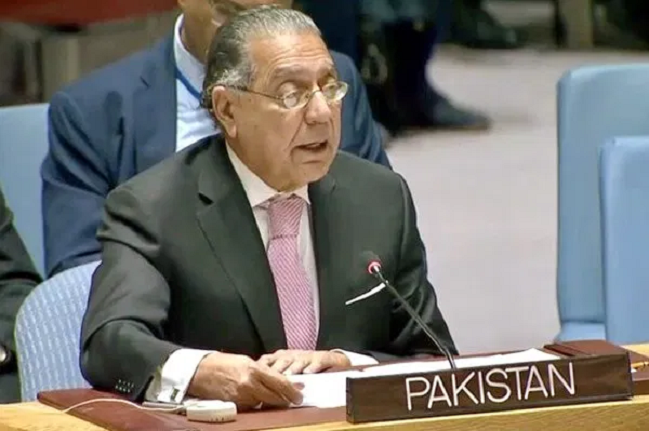
UNITED NATIONS:
Pakistan has told the UN Security Council that effective border controls are a “prerequisite” to clamping down on the twin threats of terrorism and organised crime, stressing that support for the terrorist outfits could only be choked through collective efforts.
Pakistan Permanent Representative to the UN Munir Akram told an open Council debate that the crime-terrorist nexus varied across different contexts, with several common areas of confluence, including financing tools, recruiting vulnerable youth and operating in areas outside government control.
“Being one of the principal victims of terrorism, Pakistan’s resolve to eliminate this scourge is clear and unwavering,” the envoy said, while taking part in the debate on ‘Threats to international peace and security: Linkage between international terrorism and organized crime’.
“We will continue to play our role to sever the vicious link between terrorism and organised crime in our region,” the Pakistani envoy told the 15-member Council. “This is critical for our own people, as well as for our neighbourhood and indeed the rest of the world,” he said.
Terrorist organisations like Tehrik-e Taliban Pakistan (TTP) and Jamaat-ul-Ahrar (JuA) attacked Pakistan using their bases outside of borders, he continued. “These are mercenary terrorist groups and work with third country’s state patronage for profit generation,” he said.
“This nexus of mercenary terrorists and their patrons generate finances through proceeds from narco-trade, kidnapping for ransom, extortion and smuggling of natural resources like timber,” Ambassador Akram said.
“One example of this patronage was proven by the arrest of Commander Kulbhushan Jadhav, an Indian intelligence agent,” he pointed out, saying that Jadhav was running a syndicate of criminals and terrorists to foment terrorism in Pakistan.
Similarly, Pakistan also submitted the names of four other terrorist facilitators to the Security Council’s 1267 Sanctions Committee. “Such Indian terrorism facilitators, hiding in plane sights, in our neighbourhood, continue to fuel terrorism inside Pakistan.”
Akram mentioned the recent attacks on the Pakistan Stock Exchange in Karachi. It was the work of such Indian-sponsored mercenary terrorists, he said. “Pakistan will continue to make all efforts to expose the ominous role of India, the fountain head of terrorism, in our region.”
As regards the world drug problem, Ambassador Akram called for focusing on reducing both the supply and the demand of narcotics drugs through a well-integrated, comprehensive and balanced approach. He stressed that strategies must be tailored to each situation, with the UN playing an effective role.
Akram informed that council said that Pakistan’s law-enforcement agencies continued to make record drug seizures every year which was a “tangible manifestation of our consistent and dedicated efforts not only to protect our own country, but also protect the rest of the world from this scourge.”
Earlier, Ghada Waly, executive director of the UN Office on Drugs and Crime (UNODC), presented the Secretary-General’s report on actions taken by member states to address the links between terrorism and organised crime.
Waly said the report reflected the contributions of some 50 member states and 15 Counter-Terrorism Coordination Compact entities, as well as the Counter-Terrorism Committee Executive Directorate and the Analytical Support and Sanctions Monitoring Team.
Head of the UN Office of Counter-Terrorism, Vladimir Voronkov told the virtual meeting that terrorists were exploiting the significant disruption and economic hardships caused by Covid-19 to spread fear, hate and division and radicalise and recruit new followers.



















































COMMENTS
Comments are moderated and generally will be posted if they are on-topic and not abusive.
For more information, please see our Comments FAQ